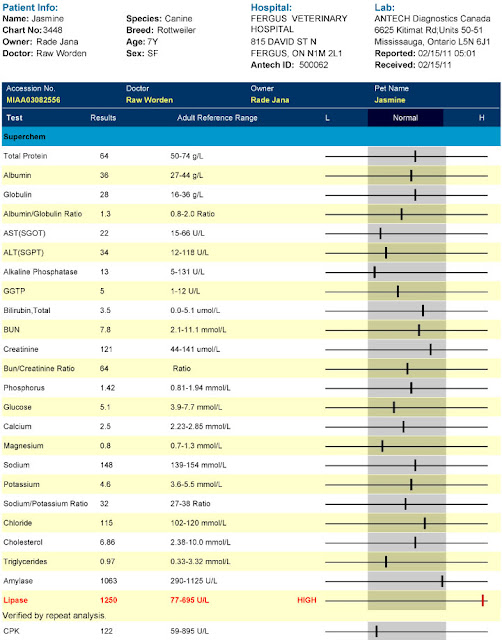Written and reviewed by John A. Bukowski, DVM, MPH, Ph.D. and Susan E. Aiello, DVM, ELS
It provides information about organ function in the body. Your veterinarian may want to perform a single test, a group of tests to evaluate a single organ or organ system, or a comprehensive profile.
A serum biochemistry profile is one of the most informative laboratory tests in veterinary medicine.
Most profiles include measurements of the following serum components:
Collectively, this information can be used to assess organ function in the body and to diagnose numerous condition, including kidney and liver disease, diabetes mellitus, and pancreatitis to name a few.
The serum biochemistry profile is also useful in monitoring the effects of various medications on the body. Many medications can specifically affect certain organs, and the serum biochemistry profile is useful to evaluate organ function when medications must be given long-term. Examples of this include monitoring liver function in animals on medications to control seizures and monitoring kidney function in animals taking nonsteroidal anti-inflammatory drugs.
You may need to withhold food from your dog prior to the test so that the serum is clear of excess fat and protein that can cloud results.
Blood is drawn from a vein in your dog's arm or neck, placed in a special tube, spun at high speed to separate the serum from the blood cells, then analyzed using specialized laboratory equipment.
Serum biochemistry profile refers to the chemical analysis of the liquid portion of the blood known as the serum.
It provides information about organ function in the body. Your veterinarian may want to perform a single test, a group of tests to evaluate a single organ or organ system, or a comprehensive profile.
A serum biochemistry profile is one of the most informative laboratory tests in veterinary medicine.
Most profiles include measurements of the following serum components:
- glucose
- proteins (eg, albumin)
- liver enzymes
- bilirubin
- kidney proteins
- pancreatic enzymes
- muscle enzymes
- cholesterol
- calcium
- phosphorus
- electrolytes (eg, sodium, potassium, chloride)
 |
| Example of Jasmine's biochemistry profile. This particular one prompted us to run a pancreatic lipase immunoreactivity (cPLI) test to make sure we were not looking at pancreatitis |
Collectively, this information can be used to assess organ function in the body and to diagnose numerous condition, including kidney and liver disease, diabetes mellitus, and pancreatitis to name a few.
The serum biochemistry profile is also useful in monitoring the effects of various medications on the body. Many medications can specifically affect certain organs, and the serum biochemistry profile is useful to evaluate organ function when medications must be given long-term. Examples of this include monitoring liver function in animals on medications to control seizures and monitoring kidney function in animals taking nonsteroidal anti-inflammatory drugs.
You may need to withhold food from your dog prior to the test so that the serum is clear of excess fat and protein that can cloud results.
Blood is drawn from a vein in your dog's arm or neck, placed in a special tube, spun at high speed to separate the serum from the blood cells, then analyzed using specialized laboratory equipment.

Comments
Post a Comment